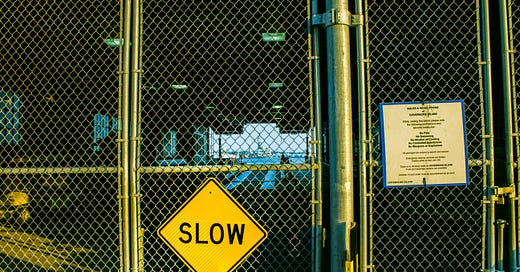I recently came across a quote that stuck with me: "Students need to read books. Entire books. Our society is distracted, unfocused, and always in a hurry. A curriculum that rushes through content perpetuates the anxiety of our time. Reading a book slowly and leisurely is a countercultural act."
A countercultural act. Just reading a book slowly. I sat with that for a moment. Because if reading a book at a normal pace is now considered rebellious, what does that say about how we approach everything else in life?
We live in a world obsessed with speed and efficiency. Blinkist gives us book summaries so we can “read” more in less time, Audible lets us zip through audiobooks at 2x or 3x speed, and our social media feeds prioritize speed and consumption over depth.
And yet, in our race to consume more, do more, see more, and optimize every moment, we don’t actually absorb anything. We’re skimming the surface, quickly passing over content without allowing ourselves to sit with it long enough to uncover its true value. We’re outsourcing our curiosity—allowing others to decide what’s “important” and feeding ourselves with pre-digested insights rather than noticing what resonates uniquely with us. And in doing so, we chip away at what makes us think differently, act differently, and see the world in a way that no one else does.
If you speed through a book summary, you only absorb what someone else decided was important. If you binge podcast episodes at 3x speed, you catch the words but miss the weight of the pauses. If you skim articles instead of reading them, you take in information but rarely sit with it long enough to connect the dots.
This, I believe, is the real danger of efficiency: it forces us to think like everyone else. When we optimize for speed, we lose the opportunity for originality, creativity, and the deeply personal connections that come from engaging with something at a slower pace.
Creativity isn’t born from efficiency. It’s born from the space we create to let our minds wander, to let ourselves be bored, to let our curiosity roam.
A few years ago, I had a student who loved Blinkist. He told me he’d “read” 50 books in a year. When I asked him what he had learned, he rattled off a list of broad takeaways—general knowledge that anyone could pick up from a quick Google search.
So I asked:“What’s a detail from any of those books that really surprised you? Something no one else would have noticed?”
He paused. He couldn’t think of one.
It’s the quirky details—the offbeat analogies, the unexpected contradictions—that make a lasting impact. These are the insights that stay with us long after we’ve closed the book or finished the podcast. But they’re often the ones that get lost in the race for efficiency.
Edge Thought of the Week:
This week, try to intentionally do something inefficient.
Pick up a physical book (not an audiobook at double speed). Read a chapter without skimming, and underline something that seems random but resonates with you. Let your brain fully engage with the words instead of just extracting the main point.
Take a long walk, without checking your phone. No podcasts, no background noise. Just walk and pay attention to what you notice along the way.
Handwrite something instead of typing it. A note to a friend, a journal entry, or even a random thought.
When we slow down, we allow ourselves the space to discover—not just consume. The most interesting people aren’t the ones who have read the most summaries or checked off the most productivity hacks. They’re the ones who’ve taken the time to look at the world a little longer, to notice the details that others miss.
Until next time,
Laura





This is the second article I've read in the last few days about how we don't read books anymore. I know I'm definitely guilty. I used to be an avid reader of books and I still have many on my bookshelves. But now I primarily read online and listen to my audible. I do really miss reading from physical books and highlighting them with little notes in the margin.
I have learnt some thing so important and what has been beating me is not to pay attention to the detail .Its so amazing